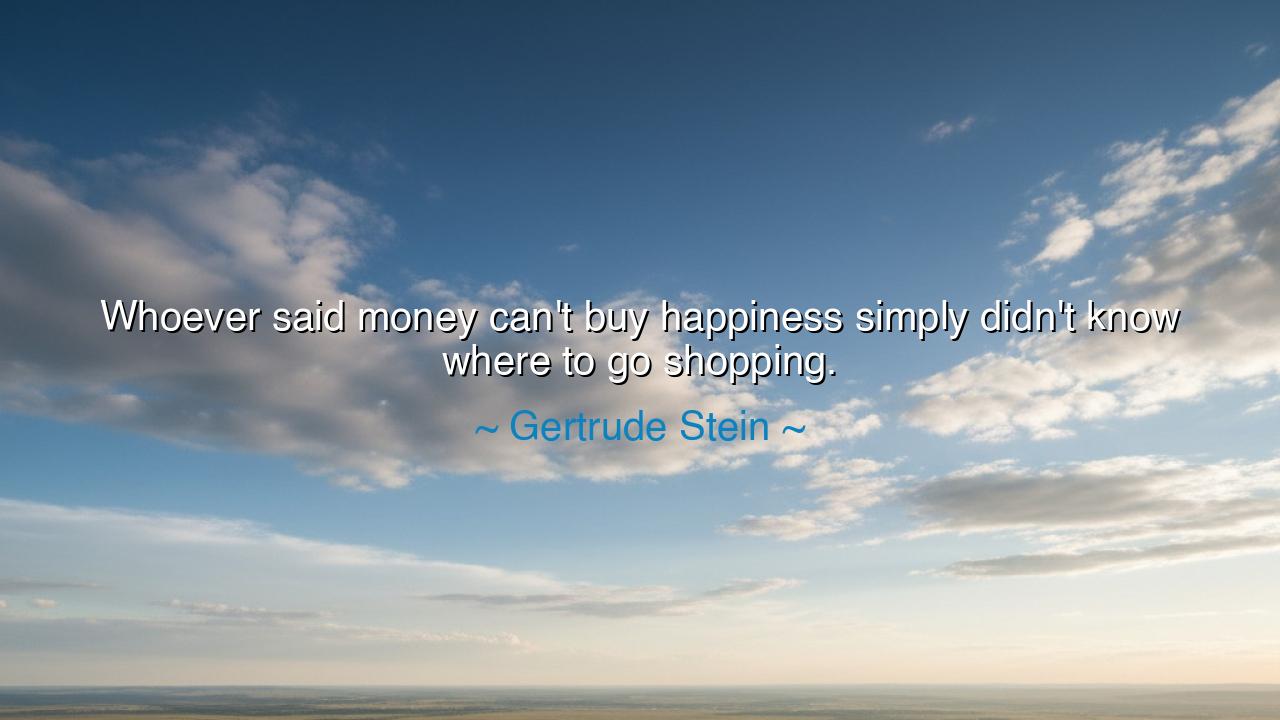
Whoever said money can't buy happiness simply didn't know where






The poet, art collector, and philosopher of the modern age, Gertrude Stein, once said with her characteristic wit: “Whoever said money can’t buy happiness simply didn’t know where to go shopping.” To the untrained ear, her words sound like humor — a light jest about wealth and pleasure. But beneath the laughter lies a deeper wisdom, born of observation and irony. Stein, who lived among the greatest artists and thinkers of her time, understood the human condition intimately. She knew that while money cannot purchase the essence of happiness, it can indeed open the doors to experiences, beauty, and comfort that nurture the spirit — if only one knows how to seek them rightly.
In the age of Gertrude Stein, the world was changing. The 1920s in Paris, where she lived, was a golden age of creativity and excess. She gathered around her the likes of Picasso, Hemingway, and Fitzgerald, artists and dreamers who lived boldly and struggled constantly. To many, Stein was both patron and philosopher — a woman who believed in art as the truest reflection of life’s richness. Her remark about money, then, was not mere vanity, but a reflection on how material wealth, when directed toward beauty, art, and meaning, could indeed bring a form of happiness that transcended the ordinary. It was a playful reminder that not all wealth corrupts; some wealth, used with awareness, can elevate.
Her words also carry a subtle critique of materialism. Stein was not celebrating greed — she was mocking it. To say one “doesn’t know where to go shopping” is to suggest that most people, in their pursuit of happiness, spend their lives buying the wrong things — possessions instead of experiences, comfort instead of connection, glitter instead of growth. The wisdom hidden in her humor is that happiness is not found in the act of buying, but in what one buys — or rather, in what one invests one’s time, energy, and love. For Stein, a painting by Picasso, a conversation with a poet, or an evening filled with laughter and music were treasures far beyond diamonds and gold. She “shopped” for joy in the markets of creativity and friendship — and there, she found it.
History, too, teaches us that money’s value lies not in its weight, but in its purpose. Consider Andrew Carnegie, one of the richest men of his age. He spent his early life amassing wealth, but in his later years, he gave nearly all of it away — building libraries, universities, and cultural institutions that still enrich lives today. He, too, learned where to “shop” for happiness: not in possession, but in giving. His joy came from creation and contribution. In this, Carnegie and Stein share a kindred spirit — both understood that happiness is not bought but built, and that money, when used wisely, can become a tool for meaning rather than a chain of desire.
Stein’s wit also reminds us that happiness is a matter of perception. The fool seeks joy in the marketplace; the wise find it wherever value meets virtue. For some, that may mean buying books, supporting artists, traveling the world to see beauty — spending money not for status, but for wonder. The tragedy of modern times is not that people have money, but that they have forgotten how to spend it with soul. They purchase endlessly, yet feel empty, because they confuse abundance with fulfillment. Stein’s humor cuts through this illusion with the sharpness of truth: happiness cannot be bought, yet it can be invited, if one knows how to exchange wealth for wisdom, and luxury for life.
At its heart, her quote also speaks of the art of discernment — knowing what truly nourishes the self. Money, in its purest form, is energy; it flows where we direct it. When spent on vanity, it vanishes; when spent on meaning, it multiplies. To “know where to go shopping” is to know oneself — to understand what brings genuine peace and joy. For one, it may be art; for another, travel or charity. Thus, Stein’s playful remark becomes a map for the soul: seek what feeds your spirit, not what flatters your pride.
So, my child, hear this lesson and hold it close: do not despise wealth, but master it. Use it not as a mirror for vanity, but as a vessel for purpose. When fortune comes your way, spend it on what endures — knowledge, kindness, beauty, and love. Support those who create, heal, and inspire. Learn, as Gertrude Stein did, to “shop” not in the markets of excess, but in the temples of meaning. For happiness is not found in the price of what you buy, but in the spirit with which you spend. And when you learn to trade gold for grace, possessions for peace, you will discover that while money cannot buy happiness, it can — in wise hands — build a life that is rich beyond measure.






AAdministratorAdministrator
Welcome, honored guests. Please leave a comment, we will respond soon